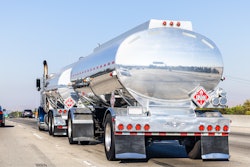Trucking news and briefs for Tuesday, Nov. 29, 2022:
FMCSA denies livestock haulers' request for longer work hours
The Federal Motor Carrier Safety Administration has denied a request from several agricultural groups seeking an exemption from certain hours of service provisions. The requested exemption was made on behalf of drivers who transport livestock, insects and aquatic animals.
Groups seeking the waiver included the National Cattlemen's Beef Association, Livestock Marketing Association, American Farm Bureau Federation, American Beekeeping Federation, American Honey Producers Association and National Aquaculture Association.
The request would have allowed drivers, after 10 consecutive hours off duty, to be on duty for 16 hours after coming on duty, and to drive a total of 15 hours during that 16-hour period.
The groups filed the exemption request in February 2019. At the time, regulations allowed livestock haulers to operate within a 150-air-mile radius of the source of the agricultural commodity, and time spent operating within that radius did not count against a driver’s daily and weekly hours limits.
The 2021 Bipartisan Infrastructure Law added to that to also include a 150-air-mile radius of the load’s destination. Livestock haulers also remain exempt from the electronic logging device mandate, FMCSA said.

“If the agency were to grant the exemption, drivers transporting agricultural commodities would be allowed six or more hours of driving time within the 150-air-mile exempt zones for the transportation of agricultural commodities, in addition to the 15 hours of driving time outside the zone,” FMCSA said in its denial. “The agency finds that allowing 21 or more hours of driving during a work shift would not likely achieve a level of safety that is equivalent to, or greater than, the level that would be achieved absent the exemption.”
[Related: Owner-ops, groups: COVID hours waiver should open door for more flexibility]
New trucker-focused urgent care, telehealth service launching
Plans are in the works to create a new network of healthcare clinics aimed at serving truckers, other travelers, and people living in rural areas. Part of its financial backing comes from trucking industry executives.
Interstate Health Systems announced its intent to establish a network of primary care, urgent care and telemedicine services along the nation’s interstate highway system. An oversold pre-seed investment round brings the medical services company one step closer to breaking what it calls the long-standing healthcare barriers faced by the nation’s 3.5 million professional truck drivers and introduces a new model for serving the healthcare needs of rural Americans and interstate travelers.
With its initial funding in place, IHS said it will begin opening 60 clinics over the next two years. Additionally, it will deliver a technology platform that integrates with trucking company platforms and includes services such as real-time telemedicine and a unified prescription service network.
The organization also announced it plans to build more than 300 urgent care clinics in the next six years located near truck stops and travel centers serving truck drivers, the traveling public and the underserved communities living nearby.
The company said it has received financial backing from various private investors, many of whom are veteran transportation and technology industry executives, including leaders from Estes Express Lines, Hirschbach Truck Line, Melton Truck Lines, Quality Distribution, Forward Air and others.
IHS is led by healthcare industry veteran Jeff Seraphine, who is serving as the company’s CEO. Seraphine formerly served as chief development officer and hospital group president for Lifepoint Health and has more than 25 years of hospital and healthcare system executive leadership experience.
[Related: How to recognize the high business risk of failing health]
Overnight I-17 closures planned in Phoenix
Drivers who travel I-17 at night will need to plan ahead to avoid major delays as the highway is closed for controlled rock blasting regularly during the weeknight overnight hours the next several months. The blasting is necessary work as part of the Arizona Department of Transportation’s I-17 Improvement Project from Anthem Way to Sunset Point.
The first full closures are scheduled for Wednesday, Nov. 30, from 10-11 p.m., and Thursday, Dec. 1, from 10-11 p.m. During the next approximately eight months, the full closures will take place two to three times a week Monday-Thursday.
Generally, blasting will occur between 10 and 11 p.m. However, the window of time for this work to occur is between 10 p.m. and 4 a.m. The start and end times of each closure could vary based on blast-site, weather and traffic conditions or other unforeseen circumstances.
On weeknights when controlled rock blasting is scheduled, crews will begin narrowing I-17 to a single lane in both directions at 7 p.m. and then fully close the highway after 10 p.m. Drivers should expect delays while crews set up traffic control, and use caution around construction personnel and equipment.
Overhead message signs alerting drivers to the upcoming closures will be displayed ahead of the closure areas. These signs will also advise drivers to reduce speeds and prepare for stopped traffic.
Bestpass acquires HVUT e-filing firm
Bestpass, a payment platform provider and toll management firm for commercial fleets, has acquired ExpressTruckTax, a Heavy Vehicle Use Tax (HVUT) e-filing system for truckers, fleet owners, and tax preparers for e-filing 2290 tax forms.
Bestpass acquires ExpressTruckTax from SPAN Enterprises, a Charlotte, North Carolina-based company that serves more than 200,000 businesses and has provided e-filing services for more than 5 million trucks.
Said Tom Fogarty, Bestpass CEO, “This is another step to provide more value to our customers. The team at SPAN has built an excellent product, and I am delighted to build HVUT e-filing and payments into our comprehensive mobility payments solution.”
Owner-operators and fleet owners are required to pay HVUT and file 2290 forms annually with the IRS to remain in good standing. This annual tax is levied on all heavy vehicles weighing 55,000 pounds or more that operate on public highways.
For fleets of 25 trucks or more, e-filing Form 2290 is required, but for fleets or owner-operators with fewer than 25 trucks, e-filing is preferred by the IRS. With the 2290 e-filing solution from ExpressTruckTax, the company said, operators can file forms and take advantage of built-in error checks that help improve the accuracy of their filings.
[Related: 2290 tax filing season: Here's how to get ahead of the deadline]








